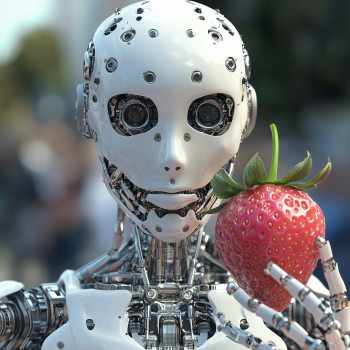Author: aibots.dk
DAI#54 – Ethereal strawberries, Apple intelligence, and AI unleashed
Welcome to our weekly roundup of handmade AI news. This week, OpenAI gave us more vaporware to look forward to. We might not need data centers to train models. And big tech writes anti-establishment letters to ‘save’ AI. Let’s dig in. Strawberry rumors You may have seen strawberries feature disproportionately in AI discussions this week. AI models still can’t tell you how many Rs the word “strawberry” contains and Sam Altman has been posting random pics of them on X. Why is the AI world ranting on about strawberries? In frustratingly consistent fashion, OpenAI has leaked whispers and rumors of
The post DAI#54 – Ethereal strawberries, Apple intelligence, and AI unleashed appeared first on DailyAI.
Healthcare Software Will Never Be the Same Because of These 2 Technologies
Can Robots Create Masterpieces?
Why is the AI world ranting on about strawberries?
OpenAI has gone fairly quiet once again, with its much-hyped voice chat features rolling out far more slowly than anyone had anticipated. But there have been murmurings about new projects in the works, including SearchGPT, which combines generative AI and web browsing and the more mysterious “Project Strawberry.” Strawberry’s origins extend back to November 2023, when a model (more so a training technique) named Q* surfaced in leaks from Reuters. It was even speculated that Q* was potentially dangerous and played some role in CEO Sam Altman’s hiring and firing last year. Q* was thought to combine an advanced reasoning
The post Why is the AI world ranting on about strawberries? appeared first on DailyAI.
Dan Maloney, CEO of LandingAI — Career Moments, Integrating Sales & Marketing, AI & Automation, Key Projects, Analytics Challenges, Fostering Innovation, IT Trends, and Entrepreneurial Advice
First AI + Education Summit is an international push for “AI fluency”
SpicyChat Pricing, Pros Cons, Features, Alternatives
The EU AI Act comes into force today: what you need to know
The European Union’s Artificial Intelligence (AI) Act officially entered into force on August 1, 2024 – a watershed moment for global AI regulation. This sweeping legislation categorizes AI systems based on their risk levels, imposing different degrees of oversight that vary by risk category. The Act will completely ban some “unacceptable risk” AI uses, like those designed to manipulate people’s behavior. While the Act is now law in all 27 EU member states, the vast majority of its provisions don’t take immediate effect. Instead, this date marks the beginning of a preparation phase for both regulators and businesses. Nevertheless, the
The post The EU AI Act comes into force today: what you need to know appeared first on DailyAI.








